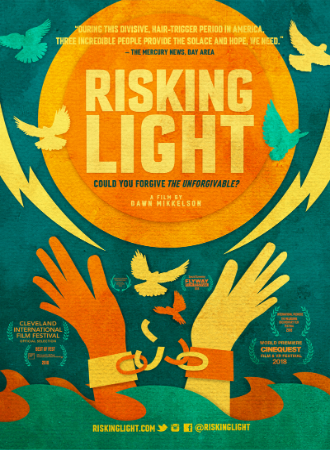
Risking Light 2018
Distributed by Collective Eye Films, 1315 SE 20th Ave. #3, Portland OR 97214; 971-236-2056
Produced by Miranda Wilson
Directed by Dawn Mikkelson
Streaming, 87 mins
Middle School - General Adult
Documentaries, Ethics, Philosophy, Political Science, Religious Studies
Date Entered: 05/21/2020
Reviewed by Jennifer Dean, Film Editor, Filmmaker, Film CuratorRisking Light tackles three stories that explore concepts and applications of reconciliation and forgiveness. First, Mary Johnson, an American woman whose son was murdered as a young man, not only forgives her son’s killer, she befriends him. Together they start the organization From Death to Life in order to encourage others to reconcile, forgive and put an end to the violence. Then, there is Debra Hocking who as an aboriginal child was abducted by the state and placed in an abusive foster home, during what is known as the Stolen Generation in Australia. As an adult she reconciles the wrongs done to her through actively bringing to light the atrocities committed by the government and attempting to reclaim her culture. Lastly, Kilong Ung, who was enslaved under the Khmer Rouge in Cambodia as child and lost his home and family, returns to Cambodia and establishes the Golden Leaf Educational Foundation. Filmmaker Dawn Mikkelson and producer Miranda Wilson expertly weave the three stories into an in-depth exploration of the ethical, philosophical and practical implications of forgiveness. They utilize the traditional three act storytelling structure; teasing out each narrative through set-up, conflict and resolution to fully explore the complexities of what it means to forgive and to move forward. The film is beautifully edited with seamless use of interviews, archival and verité footage.
In addition to being a solid asset for the study of storytelling - documentary, narrative filmmaking, or any other focus on story structure - the film would provide insight for any curriculum addressing ethics, philosophy, religious studies or politics. Particularly, it would work as an ideal companion to the study of Truth and Reconciliation as has been attempted in South Africa, Ireland and Rwanda. Of course, as Kilong Ung notes in his interview, there is a distinction between forgiveness and reconciliation: with reconciliation there is an expectation that the perpetrator is engaged in the process; whereas forgiveness can be employed by the victim without the engagement of those who committed the wrongdoing. Those nuances, in addition to the religious, secular and personal notions of compassion, mercy and forgiveness are fully explored throughout Risking Light.
Awards:
Big Water Film Festival - Audience Favorite; Cleveland International Film Festival - Greg Gund Memorial Standing Up Award Nomine; 2018 Cinequest Film Festival - World Premiere (SF Chronicle named top 10 Films of Festival); 2018 Minneapolis St. Paul International Film Festival - Awarded Best of Fest; 2018 Flyway Film Festival - Special Selection